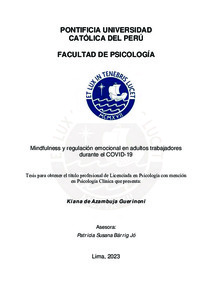| dc.contributor.advisor | Bárrig Jó, Patricia Susana | |
| dc.contributor.author | De Azambuja Guerinoni, Kiana | |
| dc.date.accessioned | 2024-01-25T18:20:58Z | |
| dc.date.available | 2024-01-25T18:20:58Z | |
| dc.date.created | 2023 | |
| dc.date.issued | 2024-01-25 | |
| dc.identifier.uri | http://hdl.handle.net/20.500.12404/26944 | |
| dc.description.abstract | La pandemia del COVID-19 supuso una serie de cambios en el mercado laboral, lo cual afectó
de manera particular a las y los adultos jóvenes y medios que trabajaban (Tušl et al., 2021). La
incertidumbre sobre la estabilidad del trabajo durante la pandemia se ha asociado con ansiedad
y depresión en trabajadores (Basyouni & El Keshy, 2021; Khudaykulov et al., 2022; Restubog
et al., 2020). Frente a esta situación, es pertinente conocer las habilidades para manejar las
emociones de la manera más adaptativa (Gross, 2013). Brown y Ryan (2003) sostienen que el
mindfulness juega un rol fundamental en la autorregulación y en las experiencias emocionales.
Objetivo: El objetivo principal fue analizar la relación entre el mindfulness y la regulación
emocional en adultos trabajadores durante la pandemia por COVID-19. Como objetivo
específico, se comparó el mindfulness y las estrategias de regulación emocional de acuerdo al
sexo y la edad. Método: 104 participantes completaron el Cuestionario de las Cinco Facetas
de Mindfulness (Baer et al., 2006) y el Cuestionario de Regulación Emocional (Gross & John,
2003). Resultados y discusión: Se halló una relación negativa entre mindfulness y la estrategia
de supresión emocional, mas no reevaluación cognitiva. Las mujeres puntuaron más alto que
los hombres en la faceta de observación mientras que los hombres mostraron un mayor puntaje
en supresión emocional que las mujeres. Se halló una relación positiva y pequeña entre la edad
y la faceta de conciencia del mindfulness. Finalmente, se resalta la importancia del mindfulness
en las personas que les permiten atender y responder a lo que sucede a su alrededor, así como
de las estrategias adecuadas al regular las emociones. | es_ES |
| dc.description.abstract | The COVID-19 pandemic has created significant changes in the labor market, which has
particularly impacted young adults (Tušl et al., 2021). This population is dealing with job
instability, which was associated with anxiety and depression during the pandemic (Basyouni
& El Keshy, 2021; Khudaykulov et al., 2022; Restubog et al., 2020). In this context, it is
important to identify resources such as emotion regulation to cope with these stressors in the
healthiest way (Gross, 2013). Brown and Ryan (2003) mention that mindfulness plays a
fundamental role in emotion regulation. Objective: The aim of this study was to examine the
relationship between mindfulness and emotion regulation in young adult workers during the
COVID-19 pandemic. A specific objective was to examine if there were significant differences
in mindfulness and emotion regulation based on age and gender. Method: For this purpose,
104 participants completed the Five Facet Mindfulness Questionnaire (Baer et al., 2006), and
the Emotion Regulation Inventory (Gross & John, 2003). Results and discussion: the results
show that there is a negative relationship between mindfulness and emotional suppression, but
no relationship between mindfulness and cognitive reappraisal. Men scored higher than women
on use of emotional suppression. Finally, there was a small positive relationship between age
and the consciousness facet of mindfulness. The results highlight the importance of
mindfulness that allows the person to attend and respond to what happens around her, as well
as of the appropriate strategies to regulate one’s emotions. | es_ES |
| dc.language.iso | spa | es_ES |
| dc.publisher | Pontificia Universidad Católica del Perú | es_ES |
| dc.rights | info:eu-repo/semantics/closedAccess | es_ES |
| dc.subject | Pandemia de COVID-19, 2020- --Perú | es_ES |
| dc.subject | Adultos jóvenes--Perú | es_ES |
| dc.subject | Estabilidad laboral--Perú | es_ES |
| dc.subject | Atención plena (Psicología)--Perú | es_ES |
| dc.title | Mindfulness y regulación emocional en adultos trabajadores durante el COVID-19 | es_ES |
| dc.type | info:eu-repo/semantics/bachelorThesis | es_ES |
| thesis.degree.name | Licenciado en Psicología con mención en Psicología Clínica | es_ES |
| thesis.degree.level | Título Profesional | es_ES |
| thesis.degree.grantor | Pontificia Universidad Católica del Perú. Facultad de Psicología | es_ES |
| thesis.degree.discipline | Psicología con mención en Psicología Clínica | es_ES |
| renati.advisor.dni | 09391905 | |
| renati.advisor.orcid | https://orcid.org/0000-0003-4685-5760 | es_ES |
| renati.author.dni | 73434735 | |
| renati.discipline | 313026 | es_ES |
| renati.juror | Bárrig Jó, Patricia Susana | es_ES |
| renati.juror | Fourment Sifuentes, Katherine Gretel | es_ES |
| renati.juror | Gargurevich Liberti, Rafael Ernesto | es_ES |
| renati.level | https://purl.org/pe-repo/renati/level#tituloProfesional | es_ES |
| renati.type | https://purl.org/pe-repo/renati/type#tesis | es_ES |
| dc.publisher.country | PE | es_ES |
| dc.subject.ocde | https://purl.org/pe-repo/ocde/ford#5.01.00 | es_ES |






